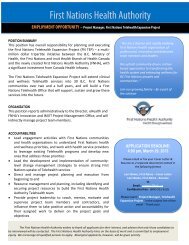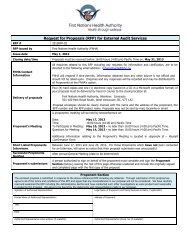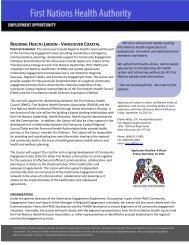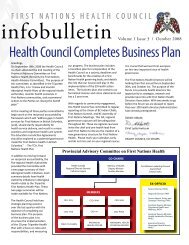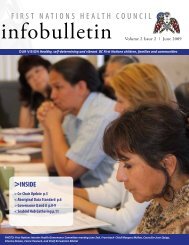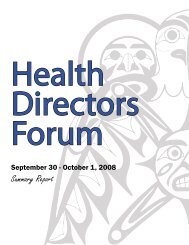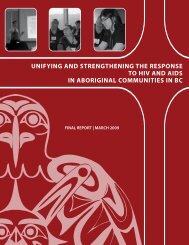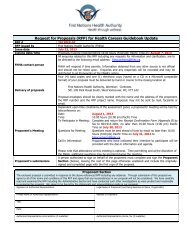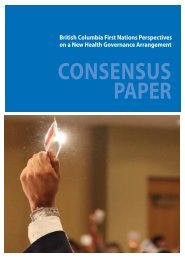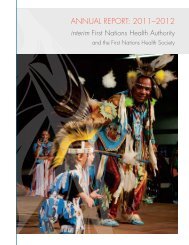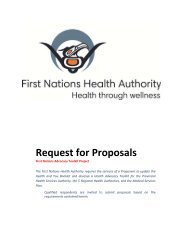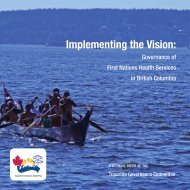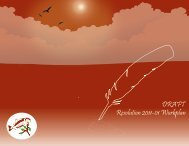pdf download - First Nations Health Council
pdf download - First Nations Health Council
pdf download - First Nations Health Council
Create successful ePaper yourself
Turn your PDF publications into a flip-book with our unique Google optimized e-Paper software.
20<br />
Though often overlooked by the health care<br />
system <strong>First</strong> <strong>Nations</strong> have consistently worked to<br />
maintain, and where necessary, rebuild traditional<br />
medicine knowledge and practices. Efforts<br />
continue to integrate traditional medicine into<br />
the health care system. The <strong>First</strong> <strong>Nations</strong> <strong>Health</strong><br />
<strong>Council</strong> is pursuing several strategies to ensure that<br />
traditional medicine is an integral part of efforts to<br />
improve the health and wellbeing of <strong>First</strong> <strong>Nations</strong><br />
(e.g. data base of traditional healers and centres,<br />
discussion groups, surveys, etc.). Participants<br />
in this table discussion examined the critical<br />
role of the philosophy, protocols and impact of<br />
traditional medicine and the ‘knowledge keepers’<br />
in their communities, practical ways of weaving<br />
traditional and western practices (e.g. Cowichan,<br />
Alert Bay), and policy and program changes that<br />
demonstrate respect for traditional medicines,<br />
support its practitioners and engage a broader<br />
audience (e.g. youth, community exchanges). The<br />
ideas highlighted from the discussion notes provide<br />
advice on how the FNHC might modify its current<br />
activities in this area:<br />
• Limited awareness in the community of<br />
traditional medicines.<br />
• Knowledge is held by individual families.<br />
• Some commercialization happening (individuals<br />
selling medicines).<br />
• Forums for both traditional/alternative<br />
practitioners, and conventional doctors.<br />
• Teaching the community traditional/alternative<br />
medicines – focus on youth programs, and<br />
summer camps, etc.<br />
• Documentation/database/book/Elders<br />
(recordings of them speaking) – some<br />
concerns about knowledge ownership (i.e.<br />
pharmaceuticals).<br />
• Community must drive policy change.<br />
• Options: providing choice.<br />
• Traditional healer forums – recognition.<br />
• Liability issues regarding traditional medicine<br />
in health centres – funding for training in<br />
traditional medicine.<br />
• Environmental protection (including financial<br />
support to maintain plants).<br />
• Integrating traditional knowledge into school<br />
system.<br />
Food Security<br />
The issue of ‘Food Security’ refers to addressing<br />
the barriers that limit or threaten a community’s<br />
access to adequate healthy food sources. In a <strong>First</strong><br />
<strong>Nations</strong> context this often includes consideration<br />
of the shift away from traditional practices to<br />
supermarket foods, access to land, contaminants<br />
and other environmental conditions. BC <strong>First</strong><br />
<strong>Nations</strong> have been very active in addressing food<br />
security issues and participants identified actions<br />
that could be taken to improve <strong>First</strong> <strong>Nations</strong><br />
people’s access to, and knowledge about, healthy<br />
food. In summary this includes:<br />
• Diffusion of innovation.<br />
• Community Champions.<br />
• Increase access:<br />
• Community kitchens.<br />
• Community gardens.<br />
• Flexible funding program.<br />
• Food boxes.<br />
• Breakfast school program.<br />
• Community food co-op.<br />
• Increase knowledge:<br />
• Community sharing of traditional and nontraditional<br />
knowledge.<br />
• Peers teaching peers.<br />
• Regional food forums.<br />
• Increase tools:<br />
• Community freezers, stoves, fridges, pots and<br />
pans.<br />
Open Space Responses<br />
• Stigma within the community around substance<br />
users and related sexual issues<br />
• At present, contribution agreements limit use of<br />
traditional models<br />
• Needs to be more attention paid to number of<br />
FN with arthritis, i.e., Arthritis Initiative<br />
• Respect for two spirit peoples health issues/<br />
Homophobia is a main concern in Aboriginal<br />
communities<br />
• Knowledge about HIV, HEPC, STIs needs to be<br />
taught to all people in communities<br />
• Right to clean water!<br />
• Create groups of young girls/teens/women/<br />
elder women to create opportunity for coming<br />
of age education<br />
• Home care centre and detox unit, that are<br />
culturally appropriate, in the northeast<br />
• Leadership must encourage, support and model<br />
real meaningful youth engagement<br />
• C’iiq’ciiga quuquulaca – our languages<br />
• Return to 100% fluency = health<br />
• In community health plans, look at options to<br />
use traditional medical interventions as well as<br />
western interventions<br />
II<br />
SECONd ANNUAl FORUm



